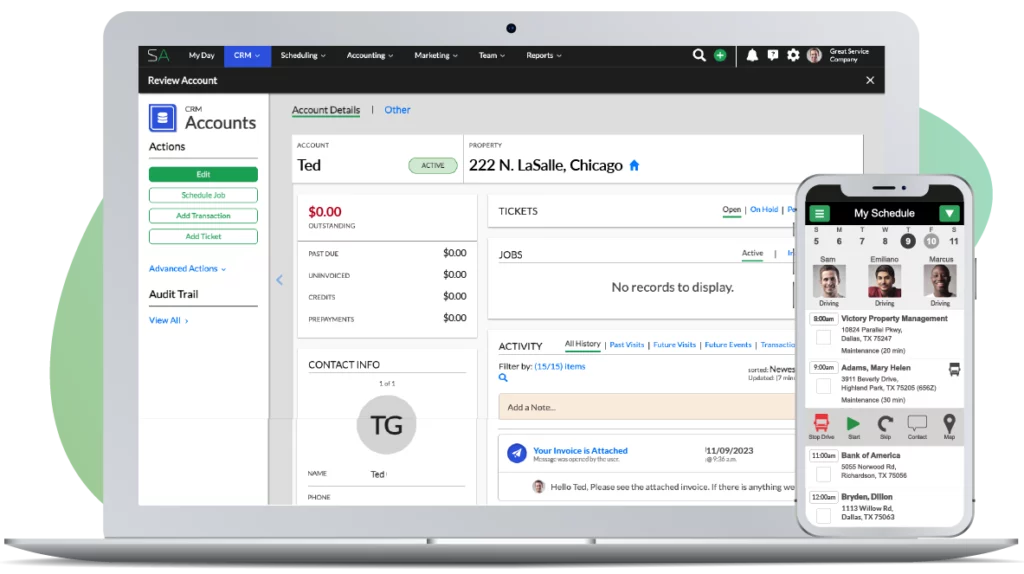Transcript
Jonathan: This question is from Scott, and Scott says that he has been door knocking and handing out business cards, and it has not been working, and he’s wondering if he’s saying the right thing, and asking for advice.
So I would start with, look at this from the home owner’s perspective. So you’ve got to really put yourself in their shoes to really figure this out. So I can’t tell you exactly what to do, but I can give you the clues to figure it out. So you have to first look at it from their perspective and imagine a couple scenarios. 1) They were eating dinner. 2) They were helping their kids do their homework. They were watching a television show. Maybe they were even expecting the FedEx guy to drop off something important that they were really excited about, and when they came to the door it was you, not the FedEx guy. There’s a million scenarios where you’re interrupting them and immediately the tension level goes up because you’re there to sell them something. You’re there to bother them. You’re interrupting. Maybe they were having a fight before they answered the door. Now, some of these things are things to keep in mind so that you don’t take it person when they’re a little rude to you or send you on your way, and it doesn’t feel like a very pleasant experience. But at the same time, you have to immediately overcome this.
So, from their perspective, when they open the door and see you, what do they see and experience? What is the subconscious feeling and thought they have in the first 10 seconds. You’ve got to make sure you get that correct. How do you look? How are you dressed? How do you speak? Do you smile? How do you present yourself? What are the very first words out of your mouth? Think of a marketing piece and a headline. If you get something out of your mailbox and that headline doesn’t immediately tell you what’s in it for and why you’ve got to have this now, well then, why would you possibly read that marketing piece? You wouldn’t. You’d throw it in the trash. When they open the door, what’s the very first thing you say? It’s like your headline. What did you immediately communicate that is in it for them? Why should they pay any attention to you, give you the time of day, and not just shut the door? So you’ve got to really think about the presentation and the experience. And once you figure it out, you do the same thing over and over and over again.
What does your business card look like? First of all, business card isn’t exciting to me. What can you give them that when they close the door they set it on the counter and when they look back at it, it reminds them why them must do business with you, or why you’re doing something, giving, delivering something that they they need? How do you keep that thing you just gave them from going into the trash. Did you use a magnet that maybe they throw it up on their refrigerator for a later time? Did you give them a gift? Did you give them something that has value that they’d want to even keep? A business card, ah, that’s just … There’s no value there. It’s not a gift of anything. There’s no value why they’d want to save it. So what can you give them that they would not want to throw away, or they’d want to save because they think they’ll use it or they’ll need it at some point. So you’re also working to make sure that thing you hand them doesn’t go in the trash as soon as they close the door. Because maybe they’re not ready for you now. Maybe they’ll be ready in four months, and so you want them to save that thing.
Other considerations would be how you’re communicating what’s in it for them. So for example, if you knock on the door and say, “Hey, I work in your area. I want to grow my business. I need some more business. I’ll mow your lawn. It would be good for me.” You wouldn’t say it that way, but you get the idea. What are you communicating? It’s all about you. If they open the door and you say, “I would like to mow your lawn for free for a year. In fact, if you’ll look across the street at those five homes across the street, notice how awesome the lawns look? I will mow your lawn for free for one year. No catch. You don’t have to pay me a dime, no tip, nothing.” Clearly that’s absurd, but what’s the difference in the two examples? The first example it’s what’s in it for you, you being the guy trying to sell. The second example, it’s all about them. That would be the dream come true situation. They open the door and you’re super professional, incredibly nice. They just immediately get this incredible first impression. You’ve immediately conveyed trust. And then you say, “You know what? Because you’re such a great person, I’m going to take care of your property for free for a year, no catch.” Well, of course, who wouldn’t want that?
So your job is to figure out the middle ground between the first and second examples I gave and give them something as close to that second example. Clearly you can’t give away lawn mowing for free for a year. But what can you do to gain their trust, maybe give them something of value that they would want to use you, try you. And so you have a far better chance when you knock on the door of winning their business if you somehow do those types of things. You immediately reposition the experience from “I want something from you,” to “I have something I would like to give you that will be a huge benefit to you and you will absolutely want it.” You being the home owner. How do you immediately convey trust? What do you leave behind that won’t end up in the trash? So what can you do? When you’re knocking on doors, I think you put yourself out there a bit. Your expense is your time, and that’s it. So I think you have some money on the table to give away.
What could you do? Could you give them something? What could you give them? Because the better the bonus, the more compelling the offer, whether it’s something you mail on a direct mail piece, where you’re advertising a bonus, an incentive, versus knocking on their door. Even when you’re knocking on the door, you still need to give a bonus incentive to make them take action now. For example, you knock on the door and you say, “I take …” You don’t start with this, but you immediately communicate the benefit for them and introduce yourself, convey trust, and then you mention, “I take care of three of your neighbors on this street, and I just wanted to knock on your door and let you know that …” Well, this is not the way to do this, so I didn’t think this through ahead of time, but the idea being, “I wanted to knock on your door and let you know I take care of three of your neighbors. I noticed that your sprinkler head was leaking, and I just wanted to let you know. And also, by the way, we’re running a special right now where for any client that signs up for service with us, we’re giving away a free iPad, or iPhone, or iTouch.” Or whatever, something, iPod. You get the idea.
Now clearly the value of something like an iPad that you would give away for mowing their lawn is too great. But what is it that you could give them as a bonus? That’s the same concept. And I’m not saying you have to give that thing away, but what is it you could give away? Because that’s a lot more compelling that just saying, “I would like to take care of your lawn because I take care of your neighbors.” Well, why should I take action right this minute? Whereas, if you say, “If you sign up tonight, and by the way, the proof of the quality of my work is the three neighbors across the street that I now take care of. If you sign up tonight, we’re running a special and I will give you a free iPad.” Again, you’re not going to use an iPad, but it communicates immediate value to them, and they don’t want to lose out on that. So what is it that you could give them of value. And it could be something so much smaller. Obviously, it would be something so much smaller than that. But if you want to win a lot more business, then you’ve got to think about it in that way. Think about all those different things. And there’s more, but if you start working on those things and you perfect it, when you find what works, you keep saying and doing the same thing over and over again, you’ll find that you have success.
I would end with this. If you’re knocking on doors, trying to sell lawn mowing, for example. At the end of the year, most home owners are not interested. They’ll just wait till next year to make a decision. They don’t want to deal with it now. If you’re knocking on the door to sell lawn care in spring when the grass is just about to start growing, or better said, has just started growing, a lot of people need it. In fact, everybody needs lawn care at that moment in time. Your chance of success goes way up. So make sure you’re doing your door knocking at the right time of year, selling the right type of service that they need, right now. It’s all about right now. Whatever you’re selling, it can’t be a scenario where they might need it in three weeks. They’ve got to need it now. So whatever time of year you’re knocking on doors, be selling the thing they need today. That’s the best chance of getting them to take action today.
So, good luck.


